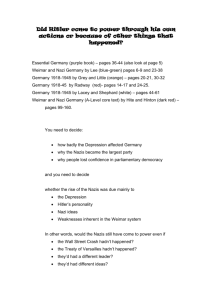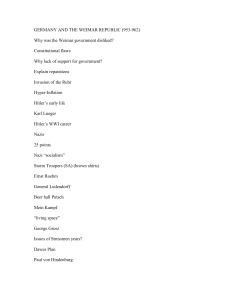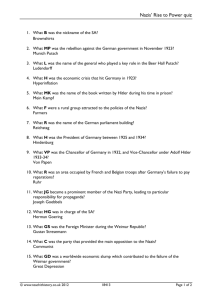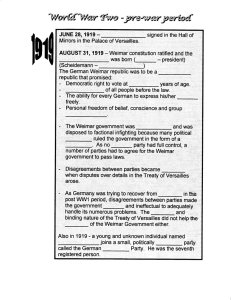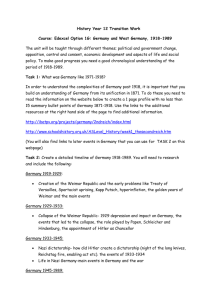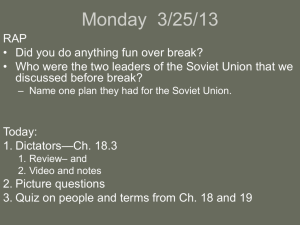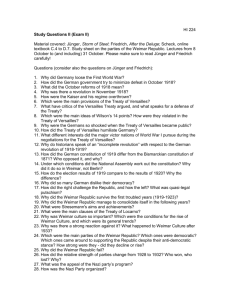Choices and Consequences in Weimar Germany
advertisement
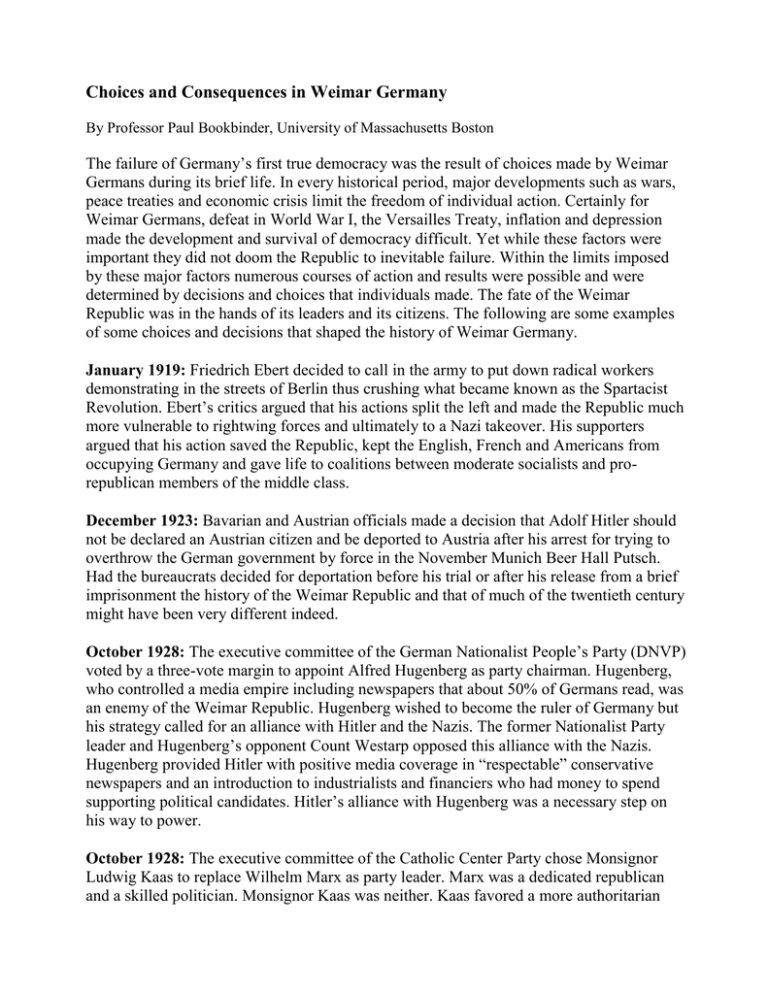
Choices and Consequences in Weimar Germany By Professor Paul Bookbinder, University of Massachusetts Boston The failure of Germany’s first true democracy was the result of choices made by Weimar Germans during its brief life. In every historical period, major developments such as wars, peace treaties and economic crisis limit the freedom of individual action. Certainly for Weimar Germans, defeat in World War I, the Versailles Treaty, inflation and depression made the development and survival of democracy difficult. Yet while these factors were important they did not doom the Republic to inevitable failure. Within the limits imposed by these major factors numerous courses of action and results were possible and were determined by decisions and choices that individuals made. The fate of the Weimar Republic was in the hands of its leaders and its citizens. The following are some examples of some choices and decisions that shaped the history of Weimar Germany. January 1919: Friedrich Ebert decided to call in the army to put down radical workers demonstrating in the streets of Berlin thus crushing what became known as the Spartacist Revolution. Ebert’s critics argued that his actions split the left and made the Republic much more vulnerable to rightwing forces and ultimately to a Nazi takeover. His supporters argued that his action saved the Republic, kept the English, French and Americans from occupying Germany and gave life to coalitions between moderate socialists and prorepublican members of the middle class. December 1923: Bavarian and Austrian officials made a decision that Adolf Hitler should not be declared an Austrian citizen and be deported to Austria after his arrest for trying to overthrow the German government by force in the November Munich Beer Hall Putsch. Had the bureaucrats decided for deportation before his trial or after his release from a brief imprisonment the history of the Weimar Republic and that of much of the twentieth century might have been very different indeed. October 1928: The executive committee of the German Nationalist People’s Party (DNVP) voted by a three-vote margin to appoint Alfred Hugenberg as party chairman. Hugenberg, who controlled a media empire including newspapers that about 50% of Germans read, was an enemy of the Weimar Republic. Hugenberg wished to become the ruler of Germany but his strategy called for an alliance with Hitler and the Nazis. The former Nationalist Party leader and Hugenberg’s opponent Count Westarp opposed this alliance with the Nazis. Hugenberg provided Hitler with positive media coverage in “respectable” conservative newspapers and an introduction to industrialists and financiers who had money to spend supporting political candidates. Hitler’s alliance with Hugenberg was a necessary step on his way to power. October 1928: The executive committee of the Catholic Center Party chose Monsignor Ludwig Kaas to replace Wilhelm Marx as party leader. Marx was a dedicated republican and a skilled politician. Monsignor Kaas was neither. Kaas favored a more authoritarian form of government and moved the party away from its position as of strong support for the Republic. Kaas was close ally of Cardinal Eugenio Pacelli, the future Pope Pius XII. He supported Cardinal Pacelli’s desire to weaken independent national Catholic political parties and have Catholics look more directly to Rome for guidance in shaping their society. The decision of the executive committee of the Catholic Center party to appoint Kaas and change the direction of the party contributed to the failure of Weimar Democracy. March 1930: Hermann Müller the leader of the Social Democratic Party announced that his party had decided to refuse to join a new government and would prefer to be in opposition. The Social Democratic Party had been the strongest supporter of the Republic and German democracy. Unwilling to confront the challenge of dealing with the great depression the Social Democrats stayed out of the government. Their decision allowed the erosion of legislative government to take place in the period from 1930-1932 seriously weakening the Weimar Republic and contributing to its failure. July 20,1932: Otto Braun, the Minister President of Prussia accepted an order suspending his Prussian State government and turning power over to the national government of Chancellor von Papen and President von Hindenburg. Braun, a Social Democratic and the most able Weimar republican politician had headed stable coalition governments of Prussia since 1920. Under his rule Prussia had become the bulwark of the Weimar Republic. In the summer of 1932 there was street fighting between Communists and Nazis in the streets of Prussia’s capital Berlin. Using this violence, which the Prussian police were controlling, as an excuse Papen and Hindenburg decided to remove the government of Prussia claiming it could not fulfill its constitutional provision to maintain law and order. The real reason for Papen and Hindenburg’s decision was to weaken the Republic and strengthen conservative and right wing forces. Otto Braun considered refusing to give up his power and calling upon his police and the workers to support his action. Deciding not to risk civil war he surrendered his government and took his case to the courts, a futile course of action. The fall of the Prussian State government is seen by many as the death bell for the Weimar Republic. July 31,1932: Over thirty-seven per cent of the German people cast their secret ballots for the National Socialist Party from an election list which showed 30 parties. This vote made the Nazis the most successful Party in Weimar’s thirteen years. It made Hitler, who was committed to destroy the Republic and German democracy, the most popular Weimar leader. By voting for Hitler, Germans endorsed a party whose leader, in his autobiography, Mein Kampf, made clear his fanatical hatred for Jews, and his desire for an expansionist aggressive foreign policy in the east. January 31, 1933: President Paul Von Hindenburg appointed Adolf Hitler Chancellor of Germany. In three months, armed with emergency dictatorial powers, Hitler would announce the death of the Weimar Republic
